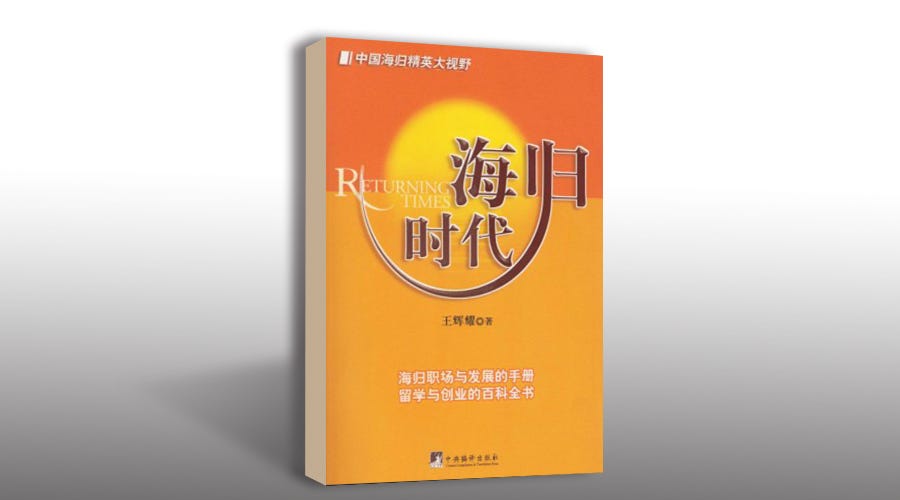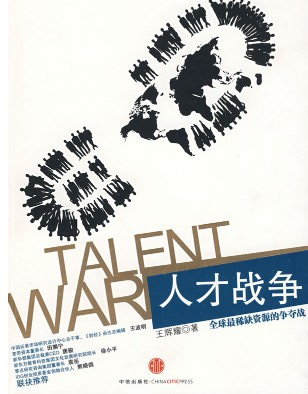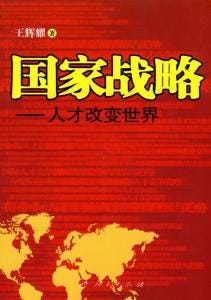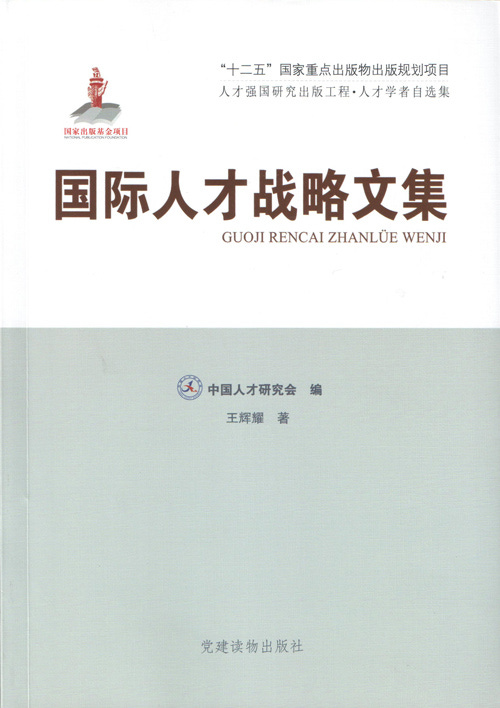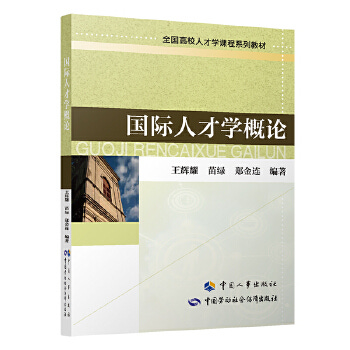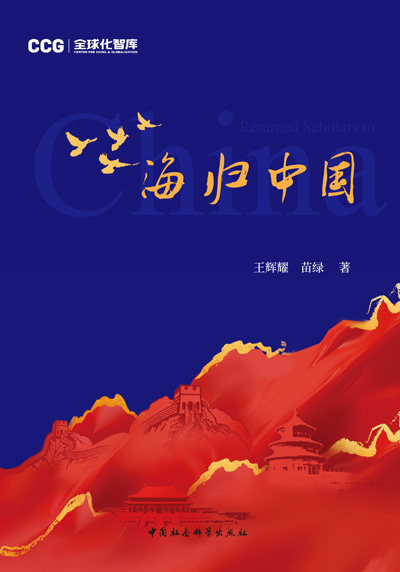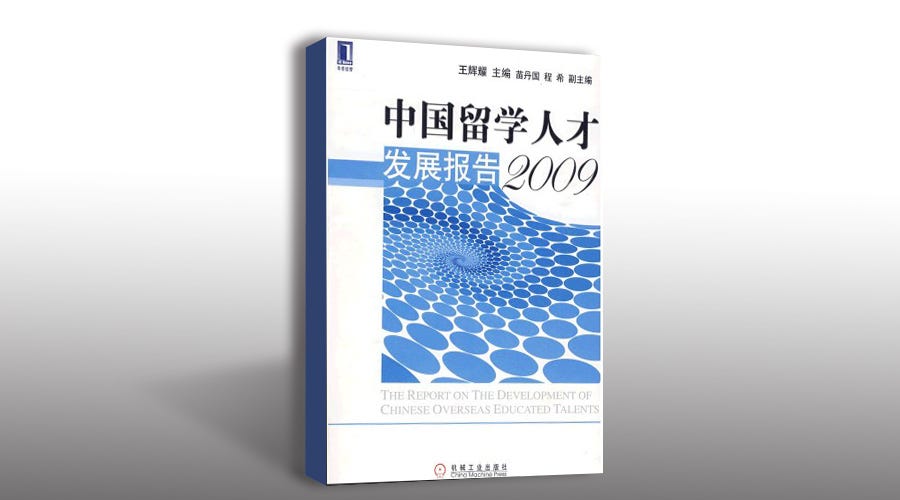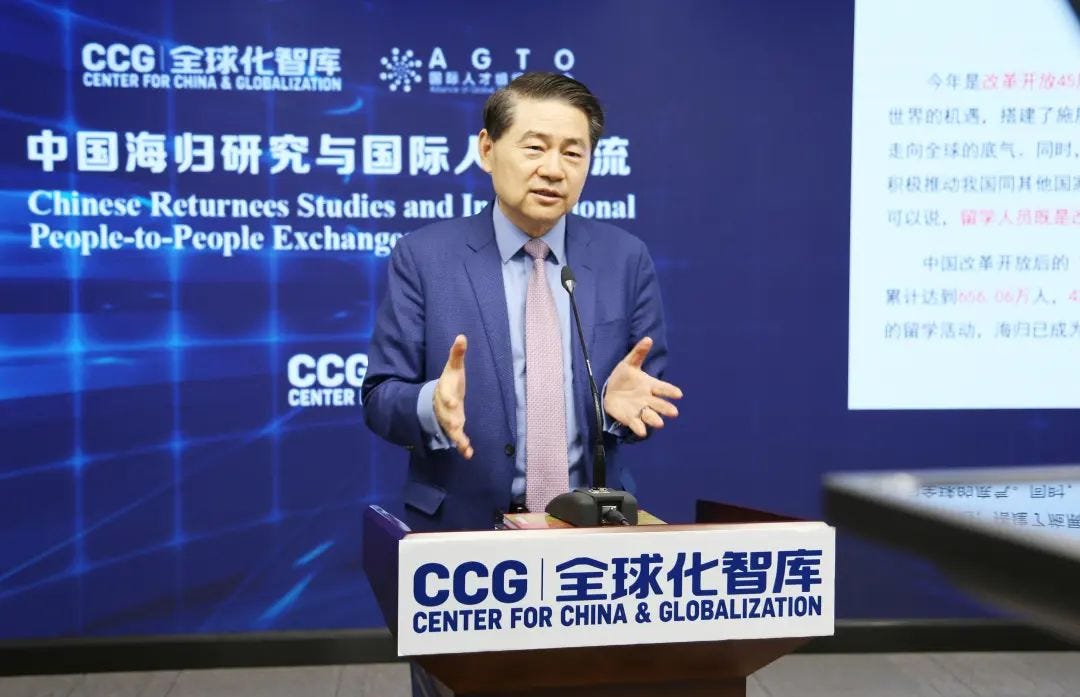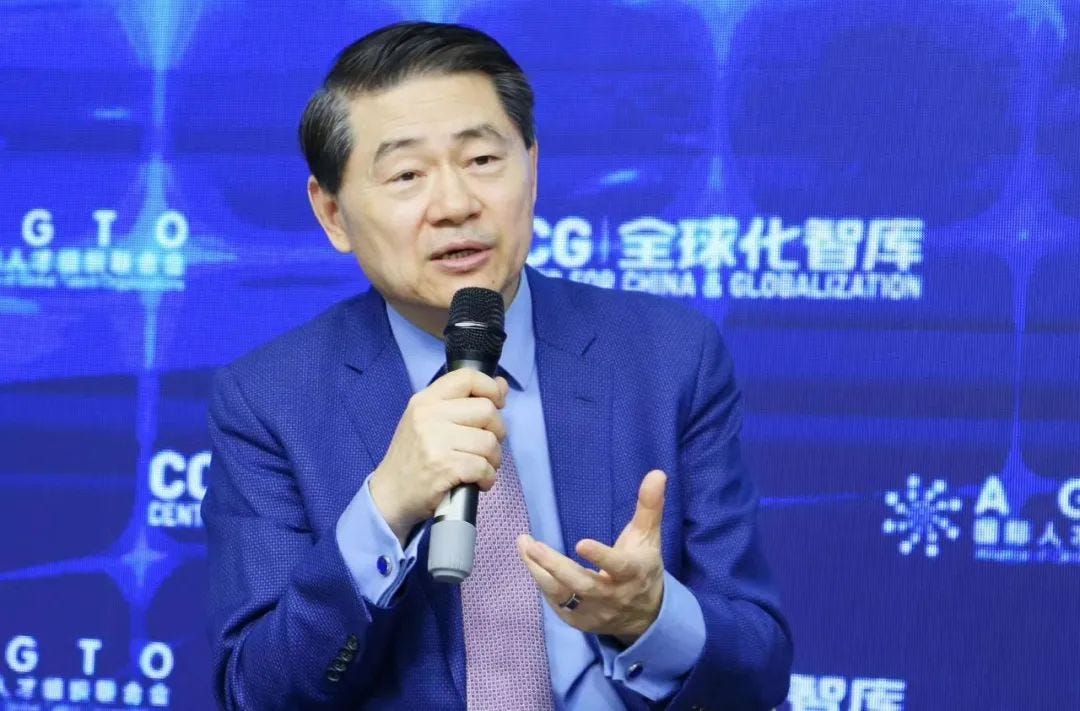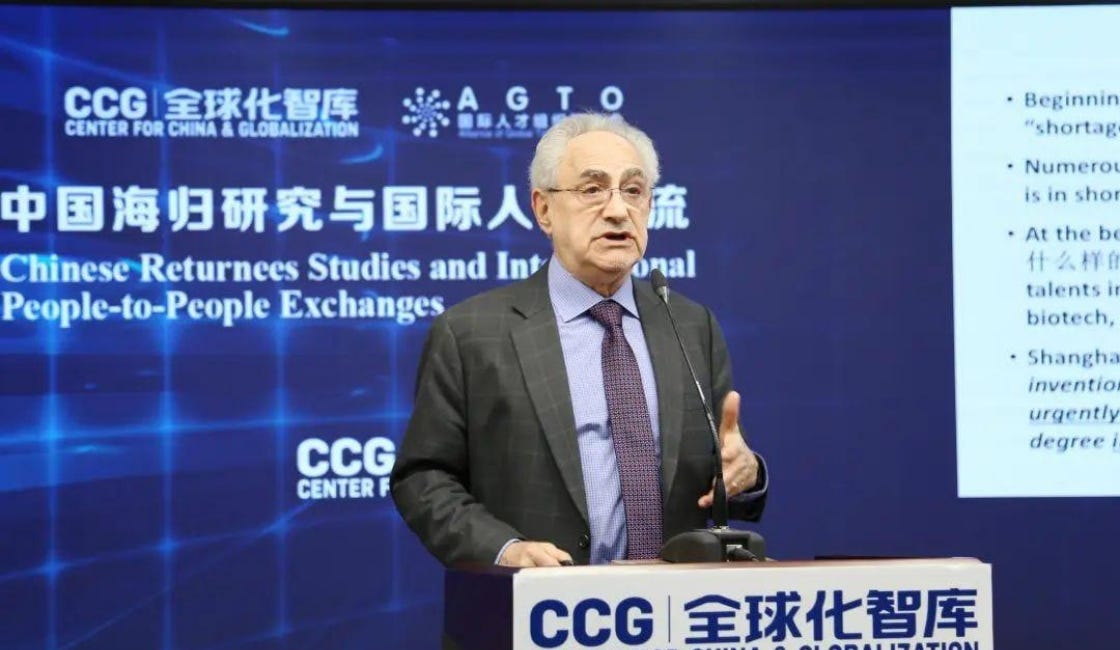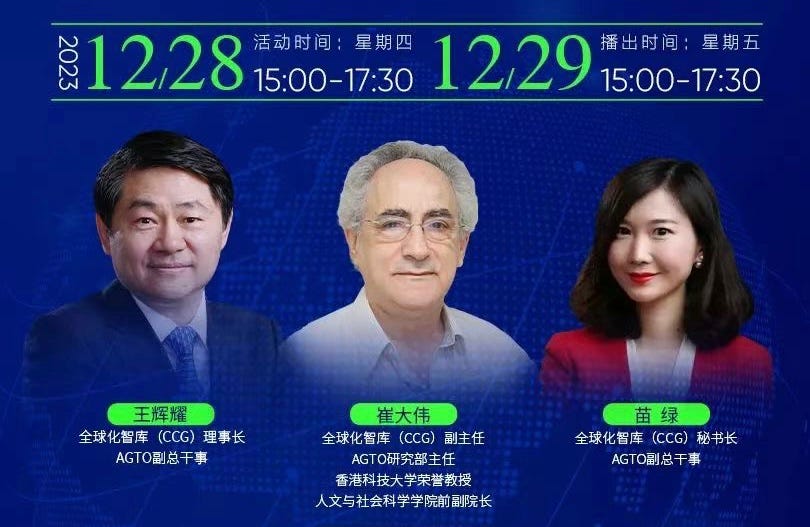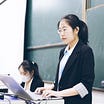Charting China's global education and returnee impact: more than 15 years' of CCG dedication
CCG and Alliance of Global Talent Organizations co-hosted seminar featuring speech by Henry Huiyao Wang, Founder & President of CCG.
Hi, this is Yuxuan Jia in Beijing. On Dec. 28, 2023, a seminar titled "Chinese Returnees Studies and International People-to-People Exchanges" was co-hosted by the Center for China & Globalization (CCG) and the Alliance of Global Talent Organizations (AGTO). AGTO is a non-governmental organization proposed by the CCG and launched at the third edition of the Paris Peace Forum on November 13, 2020.
The seminar focused on the contributions of Chinese students educated abroad to the development of China and the country's communication with the world, especially in light of President Xi Jinping's announcement in San Francisco that "China is ready to invite 50,000 young Americans to China on exchange and study programs in the next five years."
The event featured speeches by David Zweig, Professor Emeritus at Hong Kong University of Science and Technology (HKUST), CCG Vice President, and AGTO's director of research; Henry Huiyao Wang, CCG President and AGTO's Director-General; and Mabel Lu Miao, CCG Secretary-General and AGTO's Deputy Director, followed by a panel discussion of the three, moderated
The event was covered by China News Service, www.china.com.cn under the auspices of the State Council Information Office, and China Scholars Abroad under the auspices of the Ministry of Education. The full video of the event is available on CCG's official WeChat account and YouTube.
CCG Update published Prof. Zweig's speech last Sunday and the panel discussion yesterday, moderated by Luo Yan, Communications Director of CCG. Below is the lecture delivered by Henry Huiyao Wang, Founder & President of CCG. The speech by Mabel Lu Miao, Co-Founder & Secretary-General of CCG, will be published later.
Henry Huiyao Wang and CCG have made continuous dedication to researching and shaping the narrative around the phenomenon of Chinese students studying abroad and their subsequent contributions upon returning to China. Their work includes analyzing the experiences of returnees, known as "Haigui," and their significant influence in various sectors such as education, technology, and entrepreneurship. The CCG's research has not only provided insights into the policy of "attracting global talents" but also contributed to the development of international talent studies and the concept of talent globalization. CCG's initiatives, like the establishment of the Association of Global Talent Organizations (AGTO), highlight its commitment to understanding and promoting the role of global talent in contemporary society.
Thank you, Director Zheng Jinlian, esteemed guests, Professor Zweig, members of the media, scholars from our think tank, and all present at this afternoon's seminar. We are honored to gather here today. This seminar coincides with the 45th anniversary of China's pivotal reform and opening-up policy. We reflect on and anticipate the remarkable increase in overseas study, a phenomenon ignited by these reforms. The policy opened doors for Chinese students to pursue education globally, fostering their talents and empowering them to contribute significantly to China and go on to the international stage.
In a few days, we will commemorate the 45th anniversary of China-United States diplomatic relations. Over these years, one standout feature of Sino-American cultural exchange has been the significant number of Chinese students in the United States, reaching into the millions. These students, along with others studying in Europe, Japan, Asia, and regions along the Belt and Road initiative, have greatly contributed to China's educational expansion, openness, and overall development. As we mark this 45th anniversary, it's evident that international students are not just beneficiaries of reform and opening up; they are also active participants and promoters of these transformative policies.
The movement of Chinese students studying abroad began in 1978, aligned with the reform and opening up. Latest data suggests that by 2019, approximately 6.56 million Chinese had studied abroad. Considering the subsequent four years, including the pandemic period, the total is likely nearing 10 million, with an estimated 6 to 7 million having returned to China.
The Center for China and Globalization (CCG) has been at the forefront of studying this trend. Our research, spanning over two decades, focuses on the experiences and contributions of returnees. These efforts align with the national focus on this demographic, as highlighted in President Xi Jinping's speech at the 100th anniversary of the Western Returned Scholars Association. President Xi's vision emphasizes the policy of "supporting overseas study, encouraging return to the homeland, freedom of movement, and making a significant impact." This approach has shaped the talent perspective since the 18th National Congress of the Communist Party of China (CPC), encapsulated in the philosophy of "attracting global talents for our use." This policy ensures that students studying abroad have opportunities to apply their skills upon returning to China, and also provides avenues for them to contribute to their country while staying abroad.
Recently, in November 2023, the Western Returned Scholars Association celebrated its 110th anniversary, receiving a congratulatory letter from President Xi. He expressed his hope for the vast number of overseas students to continue the tradition of studying abroad and serving the country. He urged them to be patriotic and people-oriented, confident and self-reliant, pioneering and inclusive, and to engage in innovation and entrepreneurship, thereby contributing to the torrent of the times. He emphasized their role in enhancing cultural exchanges and mutual learning between China and other countries, and in contributing to the construction of a strong nation and the great rejuvenation of the Chinese nation.
Therefore, it is evident that over the past 45 years of reform and opening up, reviewing the development, role, opportunities, and challenges faced by overseas students, as well as their contributions, is extremely valuable. In the past two decades, CCG, as a leading global think tank and one of the world's top 100 think tanks, has continuously proposed new concepts, narratives, and terms related to studying abroad. Through research, publication, platform building, organizing various events, and policy advising, CCG has shaped a new narrative for returnees. This has resonated with relevant national ministries, the tens of millions of returnees and overseas students, and many sectors of society. Today, we observe that studying abroad and the returnee experience have become widespread topics, involving countless families and becoming increasingly significant social phenomena in contemporary Chinese society.
***Pre-registration for the 10th China and Globalization Forum, May 25-26, 2024, is now open at the following registration link. Check out more information about this unmissable event here.***
Next, I will review the research on studying abroad conducted over the past two decades by CCG, including works by myself and Dr. Mabel Lu Miao. Indeed, we have written many articles since 2004, nearly 20 years ago, but our first systematic work was "海归时代 Returning Times." This book was the first in China to provide a comprehensive overview of contemporary Chinese returnees, introducing the concept of "Haigui" or "sea turtles," a term now synonymous with returned overseas students. The origin of this term can be traced back to an early dialogue on Phoenix TV, where we first mentioned "Haigui."
Our book delves deeply into the waves of studying abroad and returning to China since the reform and opening up. It offers a thorough summary, particularly drawing from our personal experiences as overseas students. For instance, I studied abroad in the 1980s and vividly remember hearing the news of the establishment of China-U.S. diplomatic relations on January 1, 1979, while I was still in university. Deng Xiaoping’s call for sending thousands of students abroad, rather than just a handful, signaled to me the dawn of the Era of "Haigui." In this book, we have compiled extensive summaries and conducted systematic analyses, outlining the role, development, and phenomena of Haigui. We also offer various trends, forecasts, and suggestions, including solutions to some of the challenges faced.
At the same time, around 2004, the Central Compilation & Translation Press published another book of ours titled "创业中国 Pioneering in China." This book selected 50 returnees as case studies to systematically summarize the experiences of the Haigui community. Published nearly 20 years ago, this book was part of a significant effort at that time.
Additionally, we produced a series of books titled "海归推动中国 Haigui Promoting China," published in 2007 by the China Development Press under the Development Research Center of the State Council. This eight-volume series featured the personal stories of over 200,000 accomplished returnees. It was the first series in China to offer a comprehensive and wide-ranging study of Haigui, covering various industries and fields. The series included representatives from different sectors, including government officials, scientists, professors, and entrepreneurial business leaders. It presented the first panoramic view of contemporary Chinese returnees. As early as 2007, CCG began researching in this area, leading to these systematic and thoughtful publications.
Later, our focus expanded from returnees to an international phenomenon, as studying abroad has become the fastest-growing group worldwide, surpassing the growth rate of university students globally. Countries are increasingly competing to attract international students, signifying that student mobility and skilled professionals have become a stage for intense global talent competition. Indeed, the 21st century is marked by a competition for talent. In 2009, we published "人才战争 Talent War" through CITIC Press Group. This book had a significant impact and was reissued in 2018 by the People's Oriental Publishing & Media as "人才战争2.0 Talent War 2.0." "Talent War" was the first book in China to systematically analyze the intensifying global competition in talent acquisition.
I believe our work has provided many suggestions on how to learn from advanced international experiences and attract global talent, including analyzing policies from countries like the United States, Canada, Australia, Germany, France, the United Kingdom, and Japan. We also published a book called "国家战略 National Strategy," in 2010 by People's Publishing House, which focused on the study of returnee talent. This book gained attention from various ministries, with the former CPC Politburo Standing Committee member and then Guangdong Provincial Party Secretary Wang Yang personally recommending it. It emphasizes the need to cultivate and attract international talent and to establish a talent system in China with competitive international advantages.
In 2010, we compiled another book, published by People's Oriental Publishing & Media, which gathered 35 articles written by international students and high-level returnee talents, analyzing talent education, talent introduction, and the trend of returning students. This was another significant contribution to our research on returnees.
A major publication was produced for the 100th anniversary of the Western Returned Scholars Association, featuring 100 overseas Chinese who made significant contributions in various fields like politics, economics, science and technology, culture, and health over the past half-century. Many of them were pioneers in their fields. This influential book was published by People's Publishing House in 2014.
Two more books were published by the Party Organization Publishing House under the Organization Department of the CPC, as part of the national key publishing project during the 12th Five-Year Plan [2011-2015] and the talent-strong country research and publication project. One was "国际人才竞争战略 International Talent Competition Strategy," discussing various countries' talent competition strategies and how China can enhance its own. The other, "国际人才战略文集 International Talent Strategy Collection," covers various forms of China's talent competition, the necessity and urgency of China's talent introduction, providing new perspectives and thoughts. These books, published in 2014 and 2015, respectively, are part of our continuous systematic research.
In 2016, in the context of entrepreneurship and innovation among returnees, we published three books: "海归者说 The Returnees Speak," "那些年,我们怎么创业 How We Started Our Businesses Over the Years," and "世界这么大,我们创业吧 The World is So Big, Let's Start a Business." We observed that entrepreneurship among returnees has had a significant impact on China, spurring a wave of entrepreneurship. China has become the largest country for returnee entrepreneurship globally, surpassing other countries and regions in Europe, Russia, and parts of Asia, Africa, and Latin America. The impact of this trend on China has been substantial.
Thus, from the 20th and into the 21st century, through the 45 years of reform and opening up, I believe that the phenomenon of returnees starting businesses in China is quite unique. It's a distinctive feature of China and has significantly propelled the country's entrepreneurial wave. After compiling numerous books on the entrepreneurship and innovation of returnees, we began to develop a framework for international talent management and development, extending from the study of returnees to international talent studies. In 2020, the China Human Resources Publishing House under the Ministry of Human Resources and Social Security of China published the first textbook in China titled "国际人才学概论 An Introduction to International Talent Studies." This book provides systematic management thoughts and technical methods for the mobility and development of international talents, as well as for the practical management of their competition. It fills a gap in China's specialized textbooks on international talent research, which is noteworthy. In this area, we have conducted a lot of pioneering work.
Our latest publication, released last year, is "海归中国 Returning to China," a follow-up to "海归时代 Returning Times" from 2004. The year 2022 marked the 150th anniversary of the first government-sponsored Chinese students studying abroad. This book comprehensively traces China's 150-year journey of studying abroad, using extensive data and case studies. It covers various aspects, including the role of returnees in political participation, education, culture, health, innovation, entrepreneurship, and Sino-Western exchanges. Published by the China Social Sciences Press, this book has garnered significant attention since last year.
We have also published several books in English. In 2011, we introduced a batch of outstanding Chinese returnees in an English publication. In 2012, we released "Globalizing China: The Influence, Strategies and Successes of Chinese Returnees," which analyzes the impact of Chinese returnee entrepreneurs. Additionally, in 2015, we published a book on managing returnees, and in 2016, "Returning Migration" focused mainly on returnees. In 2017, "International Migration of China" included extensive content on returnees, and in early 2019, "China Domestic and International Migration Development" was released.
I believe one of our most notable contributions has been our research reports, starting as early as 2009. For instance, in 2009, we released the "中国留学人才发展报告 The Report on the Development of Chinese Overseas Educated Talent." In 2012, we systematically published a series of blue books through the Social Sciences Academic Press, compiling about ten reports on study abroad and returnee development. Over the past decade, we've also published nearly ten reports on immigration and regional talent competitiveness, covering various aspects of student development.
Our continuous efforts have resulted in numerous publications covering a wide range of research topics. It's fair to say that no other think tank in China has produced such an extensive series of systematic studies on returnees as we have. In addition to publishing articles in Chinese media like People's Daily, we have also published many English articles internationally. We have done considerable work in creating new research and narratives about returnees.
In terms of theoretical innovation in returnee studies, we were the first to propose the concept of five waves of Chinese studying abroad. The first wave began with the young students sent to the United States in 1872 and lasted until 1990, including early naval students in Europe. The second wave, from 1900 to 1927, included students in Japan, students sponsored by the Boxer Indemnity Scholarship Program, early students in the Soviet Union, and students in the Diligent Work-Frugal Study Movement in France. The third wave, from 1927 to 1949, was marked by students studying in Europe and America, including many future Nobel laureates. The fourth wave, from 1949 to 1965, saw a surge in students going to the Soviet Union, many of whom were instrumental in China's Five-Year Plans. The fifth and largest wave, coinciding with the reform and opening-up policy from 1978 to the present, includes both government-sponsored and self-funded students. This classification represents a significant aspect of our research.
Secondly, our research evolved from focusing on returnees ("Haigui") to also include "seagulls" (Haiou), reflecting the transition from talent outflow to return flow and then to a circular flow of talent. This is a significant shift. We also addressed the concept of "seaweed" (Haidai), which Professor Zweig argues is essentially non-existent. We have summarized many such concepts, and notably, we introduced the term "seagull."
Furthermore, we elevated the study of international talents to the discipline of international talent studies. A large portion of international talents have backgrounds as returnees. "An Introduction to International Talent Studies" is the first specialized textbook in a series for university talent studies courses, representing our innovative work in elevating international talent to a systematic field of study.
We also proposed the concept of the era of talent globalization, emphasizing that to become a globalized talent, individuals must be globally mobile, transitioning from outflow to return flow to circular flow, and possess strong international competitiveness. In a recent interview with China Youth Daily, I discussed the increasing number of Chinese youth seeking employment internationally, illustrating this talent globalization. China is witnessing an influx of international youth and simultaneously sending more of its youth worldwide. In the future, the dual circulation of talent, both domestic and international, will be crucial. As we move into the third wave of globalization characterized by the flow of goods, capital, and now talent, China is becoming the world’s largest exporter of talent and returnees. This significant movement of talent holds great importance for China's international development, reform, opening up, participation in international rules, and promotion of the Belt and Road Initiative. We also proposed the establishment of a new international order for talent mobility.
We introduced the concept of a Talent WTO, aiming to gather talents from various countries for comparison and research and to establish a specialized international organization to maintain the order of talent mobility and competition.
Based on this concept, we initiated the Association of Global Talent Organizations (AGTO) in 2020 at the Paris Peace Forum, which was first selected as a project for the forum in 2019. The third edition of the Paris Peace Forum marked its official establishment. We didn't just propose a concept; we established an international organization to promote this initiative.
Finally, in our study of returnees, we summarized the ten major contributions of Chinese returnees in the new era, highlighting their increasing role as pillars in education, science, culture, health, and other fields. First, they actively participate in governance and politics, with many serving as members of the People's Congress and the CPPCC. Second, they engage in civil diplomacy, enhancing China's soft power. Our think tank, largely comprised of returnees, has significantly contributed to this area.
Third, they play an active role in associations and philanthropy, contributing to environmental protection and various social organizations, including NGOs. Fourth, they have become a mainstream force in the high-tech and new economy sectors within China's entrepreneurial wave, influencing areas like venture capital, internet giants, and the digital economy. Fifth, returnees are key drivers in Chinese companies' international expansion, especially in Belt and Road initiatives and globalization efforts.
Sixth, many returnees lead multinational corporations in China, playing a major role in the "sinicization" of these companies. Seventh, they are vital in developing tertiary industries like services, advanced manufacturing, and new energy sectors. Eighth, returnees bring back advanced international talents and technologies, contributing to foreign investment and other areas. Ninth, they introduce innovative international concepts, business models, and socio-cultural ideas.
From an entrepreneurial perspective, returnees have made significant contributions, such as driving development in new economies, technologies, the internet, IT, telecommunications, and media. They have introduced venture capital mechanisms and concepts to China, boosting the domestic entrepreneurial wave. They have also brought back new financing models and international capital, alongside advanced technologies. These contributions have facilitated feedback loops between China and the world, accelerating China's integration with the global economy. Returnees have also been instrumental in attracting multinational investments in China, raising management standards in rapidly growing economic sectors, and bringing a wealth of talent to domestic innovation and entrepreneurship. Furthermore, they have led the rise of China's entrepreneurial wave, fostering a culture that values entrepreneurship across society.
Over the years, we have established numerous platforms for returnees, with our Center for China and Globalization being a significant one. Specializing in research on returnees, we have maintained a leading position in this field domestically. In the past two decades, we have been actively involved in founding various influential organizations. For instance, in 2002, we participated in the establishment of the Western Returned Scholars Association Chamber of Commerce (WRSACC). In 2005, we founded the WRSA Chamber of Commerce 2005 Committee, a high-end and leading returnee organization in China. Additionally, in 2007, we played a role in founding the WRSA Advisory Committee. Our involvement extends beyond our work to participating in and creating many social platforms.
We also organize numerous activities to foster consensus and shape new narratives. These include forums, lectures, dialogues, seminars, and roundtable discussions. For example, we initiated the Chinese Returned Scholars Innovation and Entrepreneurship Forum. We have annually released the list of Top 50 Innovators and Entrepreneurs among Chinese Returned Scholars and have been involved in organizing seminars on the development and construction of Chinese returnees. We have held 15 sessions of the China Returned Scholars Innovation and Entrepreneurship Forum, with 14 in Beijing and one in another location. Before the pandemic, this forum was an annual and very representative event in China, held continuously for 15 years, marking its significant scale and impact.
For seven consecutive years, we have released the Top 50 Innovators and Entrepreneurs Among Chinese Returned Scholars list at the Convention on Exchanged Overseas Talents and Guanzhou Conventino of Overseas Chinese Scholars in Science and Technology. This initiative involves extensive research and analysis, expert consultations, thematic reviews, monitoring, and media examples. We have also published lists such as the Top 40 Returnees in 40 Years of China's Reform and Opening-Up and the Top 70 Returnees in 70 Years, which have garnered widespread social attention. Many returnees proudly include these recognitions in their Baidu Baike profiles, which I find very gratifying.
Additionally, we have played a key role in the Western Returned Scholars Association, hosting three High-Level Overseas-Educated Scholars' Advisory Roundtable meetings. These events brought together experts from abroad to offer advice and suggestions to the nation, involving returnees from over a dozen countries. This has been immensely helpful in facilitating communication and continually improving both international and domestic policies and development.
In terms of policy advocacy, we have made numerous contributions. For instance, we proposed several initiatives for returnees, such as the China Overseas-Educated Scholars Entrepreneurship Support Program, which received approval from the central leadership. We have also conducted extensive policy research in the establishment of the National Immigration Administration. Thus, in the policy arena, we continuously offer suggestions and work to create a better environment for Chinese returnees, contributing significantly through our initiatives, including our blue book reports, which I will discuss later.
To conclude this introduction, since the reform and opening up, nearly ten million Chinese have gone abroad for studies or work, with hundreds of thousands leaving and returning each year. Chinese returnees have become a century-long and global phenomenon, far from being a transient or localized occurrence. They have emerged as a vital force in China's economic and social development and a powerful contingent in the country's modernization process. As we commemorate the 45th anniversary of China's reform and opening up and the establishment of diplomatic relations between China and the United States, studying abroad and returning remain significant phenomena and subjects of research in our society. There are many new issues in this field that require our study, discovery, and summary. As academic interest in returnees continues to grow both internationally and domestically, I believe that the study of returnees might even evolve into a new field of academic inquiry. Thank you all for your attention; this concludes my presentation.
Pre-registration for the 10th China and Globalization Forum, May 25-26, 2024, is now open at the following registration link. Check out more information about this unmissable event here.
More CCG Updates coverage from the same event:






